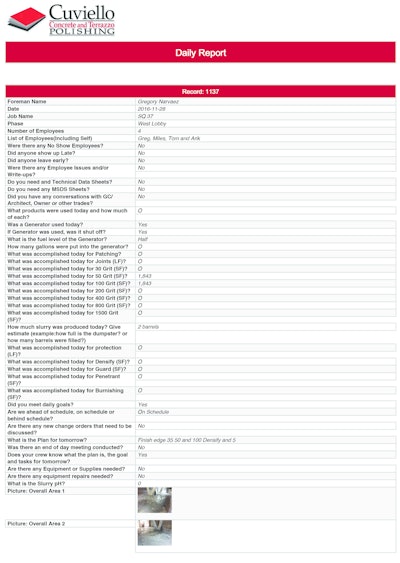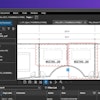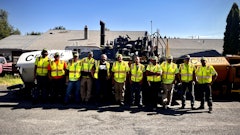
Project management starts a project and closes a project. A Project Manager is in charge of implementing, planning and completing a project that has a specific goal with specific requirements. Project managers are responsible for the profit of the job and sometimes bid the work.
Project management for concrete polishing is more challenging than other trades because of the inconsistencies within concrete, the lack of skilled labor compared to other trades such as a painter and variances in expectations of the owner, architect and general contractor. No two slabs are the same. There are various mix designs, color variations from one truck to the next, means and methods for finishing the slab, environment conditions, curing variables, and timing of finishing, pour sizes, equipment and man power used to finish the slab. All of these variables in combination result in a different substrate that needs to be polished. The finished product from one job to the next is different. A Project Manager for polished concrete needs to be able to convey and teach this information in an understandable way and be able to be organized and track how and when this information was said. They need to be able to work under conditions when one trade is supposed to provide the substrate to be polished based on plans and specifications that the concrete polisher based his pricing on.
What are the tools needed for Project Managers in commercial concrete polishing?:
- Mission Statement
- Organization
- A degree in Psychology
- Leadership
- Communication
- Documentation
- Prioritizing
Mission Statement
Every company should have a Mission Statement. A Project Manager should also have their own “Mission Statement” that represents their position and their unique, individual self. It can be a straightforward as:
“Communication and implementation is my end game.”
Or it can be more detailed as: “I dedicate my time to show that I will keep the lines of communication always open and constantly deliver the necessary information needed to properly start and end a project.”
Making your own Mission Statement reinforces your confidence in your role as a Project Manager and gives you a direction to follow.
Organization
How do you keep everything organized? What happens when challenges or conflicts come your way? What, how, when and why do you document and communicate? What should come first?
Keeping all your projects, documents, conversations organized can be very challenging. There isn’t a right way or wrong way to be organized. An individual needs to find their right way or system that fits their needs, however, once you find that way, you need to stick with it. Whether you make file folders for your individual projects or scan everything for folders into a server; your time needs to be devoted to being organized. With concrete polishing, you are most likely a subcontractor to a General Contractor. Trying to avoid any and all conflicts that sooner or later will arise, organization is critical. You will want to be able to locate your scope or old email conversations to back yourself up. Being organized will always help you in every situation you encounter. Organization is one of the hardest requirements of managing projects. There is so much more needed to stay organized than just keeping project folders or old email conversations. As a Project Manager for concrete polishing, you have to pay attention to the details. You have to know the project and requirements in and out. The scope, the plans; you need to know all that is needed to bring the project to completion. Organization will also be helpful with keeping track of the many odds and ends, including, production numbers and duration times, change orders, completion of work to be billed, conversations and job costing numbers. It is common you will manage more than one project at a time. Some project managers will be starting two to three projects while still closing out two to three others. Organization will make the difference in success or failure.
Psychology and Leadership
One would think a degree in Psychology should be a requirement in project management.
When do you lead? When do you let go? When do you discipline?
There are many personalities and you'll have to handle people differently according to how they may react to ensure conflicts can be resolved in a functional and timely manner. A person’s reaction can make a situation defuse or grow increasingly worse. Knowing the person and being able to read the person you are dealing with is a major component to solving conflicts.
Knowing and understanding behaviors of an individual will help in resolving conflicts and challenges. You may have to be forceful with some general contractors when dealing with a change order situation or you may have to deliver the news in a softer manner depending on their personality.
Understanding behaviors is also helpful when dealing with crew members. When working with employees you must be a leader. You cannot be in the field or on a project 100 percent of the time. You put your trust in your crew members to work together and to follow the step-by-step process while all having different personalities, experiences, roles and responsibilities. This can be very challenging. Knowing who to pair with who and how to talk and handle an individual when a conflict arises helps to defuse the situation. It also helps the individual feel that you are on their side and you are there to help not to hinder. You must treat every situation as “it matters”.
There are other challenges when it comes to employees as well. You need to address work load and discipline. There may be times when the work load is on overload and you'll need to spread people thin. When there is little work, you may need to decide whether or not to keep people, give them hours to work or send them home until more work is awarded. Knowing the situations of the employees, how they perform and how they will react will help make these challenging decisions.
There are times in this line of work where loyal employees are hard to come by. You will get the occasional no show employees and excuses like, “My alarm didn’t go off.” and “I don’t have gas to get to work.” This may cause a delay on your job and you need to communicate this to the general contractor. This is where discipline comes in. How lenient are you and when do you “crack the whip?” You have to be fair, but you can deliver your message differently depending on the employees’ personality and number of defenses. When considering the employees’ feelings, you also must remember, other employees are watching how you discipline one from another. These are the many challenges in managing a workforce.
Communication and Documentation
Communication is vitally important. In order to communicate information, you must document the information first. So how, when and what do you document and communicate? ANYTHING and EVERYTHING; always cover yourself! Things to document:
- All conversation between you and others
- Any delays
- Extra work done or requested
- Damages by other trades
- Change orders
- Schedules
- Duration times
- Materials needed
- Any other problems
A daily report submitted every work day is how and when this information is communicated. These reports will document everything listed above with pictures taken as well. The Foreman in the field on the jobsite will create the report and will send it to the Project Manager to review. The Project Manager will go through the report, determine if the General Contractor needs to be contacted to discuss and communicate any problems and possibly send the report to the General Contractor as well. This is where communication fits in. Everything listed above in documentation is communicated to the Project Manager from the Foreman. If there is a conflict, the Project Manager will then communicate to the general contractor.
Another crucial part to the project is duration timing. A General Contractor will always be asking, “How long will this concrete polishing process take you?” The length of process is sometimes hard to predict not knowing what challenges the concrete slab may present. It is always necessary and a requirement to keep the General Contractor in the loop of your schedule and duration timings on the project; as well as any delays. One of the most important requirements to a General Contractor is communication. Communication goes a long way in obtaining appreciation from the General Contractor.
Although project management has a lot to do with paperwork and numbers, that is not the only task required. Project managers need to have a complete overall understanding of the specifications, plans and scope of work. They need to do a scope review with the General Contractor prior to mobilizing onto the jobsite, review the contract, know the exact requirements of the project, know the expectations of the Architect, Owner and General Contractor and manage and understand the specific safety requirements of the job. Project Managers schedules the job, keeps track of production numbers and understands budget limits. As a subcontractor, we are paid to provide a product per the plans and specifications. A Project Manager must know and follow these specs and plans to produce the product being paid for. When a General Contractor asks you to do a task not being paid for, a Project Manager must recognize this and communicate to them that the added work in not in our scope and there will be an additional charge in the form of a “change order.” Working conditions, temporary facilities or the size of the concrete polished area given at a time can cause conflicts. These should all be listed in the contract and scope of work. Performing a review with the General Contractor in a scope meeting ensures everyone has the same understanding. This reduces conflicts from the start of a project. During a scope review meeting all requirements and expectations are reviewed. All meetings should be documented and a summary sent to all parties. The ultimate goal is to make an Owner happy, but if expectations are not managed by both the General Contractor and the Project Manager this can be a disaster. There are many variables that can affect polished concrete: concrete cracks, different colored placements, varying aggregate exposure at different locations, etc. It is a Project Manager’s responsibility to explain these variables to the General Contractor so they can explain them to the owner.
Prioritizing
Accept your job schedule will always be changing. The following are variables that cause delays on jobs:
- Change orders
- Other trades
- Weather
- Lack of employees
- Equipment failure
- Need of materials
- Curing compound
- Glue removal
- Area not fully turned over
- Having to clean up behind other trades
Whatever the variable may be, your schedule will be changing. So how do you stay on schedule or close to it? You manage your crews daily. You solve the crews’ needs, problems and conflicts and communicate to the General Contractor what is going on so there are zero surprises. I have come to find that as long as you stay on top of the schedule and communicate to the General Contractor any changes, they are more likely to partner with you then send demands. This turns out to be an easier working environment for all. Delays do not only affect a General Contractor, they affect you as a Project Manager too because you are not reaching your budgets. There is a limit for everything and when durations are pushed to longer times, the budget is getting smaller and smaller. Not only is the Project Manager managing the schedule and the durations, but they are managing the overall budget of the job. They have to ask:
- “Do I push this job out another week to avoid overtime?”
OR
- “Do I have guys work an extra one to two hours a day and go into overtime to get done this week?”
And after asking yourself these questions see what this does to a job’s budget and duration times. You have to manage budget with managing schedules all while still meeting the General Contractors’ requirements of duration, scope, specifications and plans.
Being a Project Manager requires a direction, attention to details, working effectively with the workforce and maintaining relationships with the General Contractors and other subcontractors. Attention to all of these items will reduce the risks and increase the success of your project. The feeling of accomplishment by all and sustaining good relationships will produce future work. No two projects are alike. Just when you think you finally have the role down, the requirements for a different concrete polishing project, General Contractor, specification or scope change on you.
Ed. Note: Nina Clause is the Project Manager for Cuviello Concrete and Terrazzo Polishing located in Stevensville, M.D. and has been in the industry for five years. She can be reached at [email protected] or at www.cuvielloconcrete.com


















